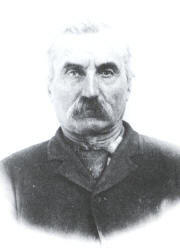Joe Juneau (prospector)
From Wikipedia, the free encyclopedia
Joseph Juneau (1833 or 1836–1899) was a miner and prospector from Canada who was born in the Quebec town of Saint-Paul-l'Ermite (later renamed Le Gardeur and now incorporated into the city of Repentigny) to François Xavier Juneau dit Latulippe and Marguerite Thiffault Juneau. He is best known for co-founding, with Richard Harris, the city of Juneau, Alaska, United States. The first major gold discovery in Juneau or Douglas Island (across from Juneau) was circa 1880. It has been the political capital of Alaska since 1906.
His Native American guide in southeastern Alaska was Chief Kowee. Kowee is credited with exploring much of the Juneau area. Richard and Joe were sent with Kowee by George Pilz, an entrepreneur and mining engineer from Sitka. Richard and Joe traded with the natives much of their grubstake for hoochinoo. When they returned to Pilz empty-handed, he promptly sent them back to the Juneau area. There, Kowee took them beyond Gold Creek (which today flows beside the city's United States Federal Building[1]) to Silver Bow Basin. Today, a creek on Douglas Island is named Kowee Creek.
After the discovery of gold in Juneau, Richard and Joe loaded approximately 1,000 pounds of gold ore back to Sitka.
The town was originally called Harrisburg or Harrisburgh, and then Rockwell. Miners often called it "'Rockwell' also known as 'Harrisburg'" in their mining records. There was also a proposal to name the town Pilzburg for Pilz. It did not take up its current name until a miners' meeting on December 14, 1881. The name Juneau received 47 of the 72 votes cast while Harrisburg received 21 votes and Rockwell only 4.[1] Joe Juneau reportedly bought drinks for fellow miners to name the city in his honor.[2]
Joe Juneau traveled to Dawson City, Yukon during the Klondike Gold Rush of the 1890s. He usually spent gold as fast as he got it but at the end of his life he owned a small restaurant in Dawson. Juneau died of pneumonia in March, 1899 in Dawson. His body was brought back to the town that bears his name and was buried in the city's Evergreen Cemetery on August 16, 1903.
His cousin Solomon Juneau founded the city of Milwaukee, Wisconsin.[3]
His Native American guide in southeastern Alaska was Chief Kowee. Kowee is credited with exploring much of the Juneau area. Richard and Joe were sent with Kowee by George Pilz, an entrepreneur and mining engineer from Sitka. Richard and Joe traded with the natives much of their grubstake for hoochinoo. When they returned to Pilz empty-handed, he promptly sent them back to the Juneau area. There, Kowee took them beyond Gold Creek (which today flows beside the city's United States Federal Building[1]) to Silver Bow Basin. Today, a creek on Douglas Island is named Kowee Creek.
After the discovery of gold in Juneau, Richard and Joe loaded approximately 1,000 pounds of gold ore back to Sitka.
The town was originally called Harrisburg or Harrisburgh, and then Rockwell. Miners often called it "'Rockwell' also known as 'Harrisburg'" in their mining records. There was also a proposal to name the town Pilzburg for Pilz. It did not take up its current name until a miners' meeting on December 14, 1881. The name Juneau received 47 of the 72 votes cast while Harrisburg received 21 votes and Rockwell only 4.[1] Joe Juneau reportedly bought drinks for fellow miners to name the city in his honor.[2]
Joe Juneau traveled to Dawson City, Yukon during the Klondike Gold Rush of the 1890s. He usually spent gold as fast as he got it but at the end of his life he owned a small restaurant in Dawson. Juneau died of pneumonia in March, 1899 in Dawson. His body was brought back to the town that bears his name and was buried in the city's Evergreen Cemetery on August 16, 1903.
His cousin Solomon Juneau founded the city of Milwaukee, Wisconsin.[3]

No comments:
Post a Comment